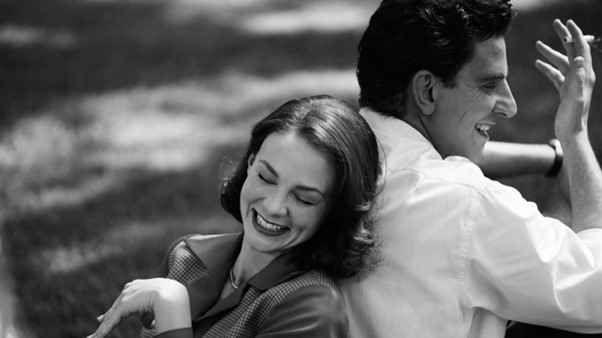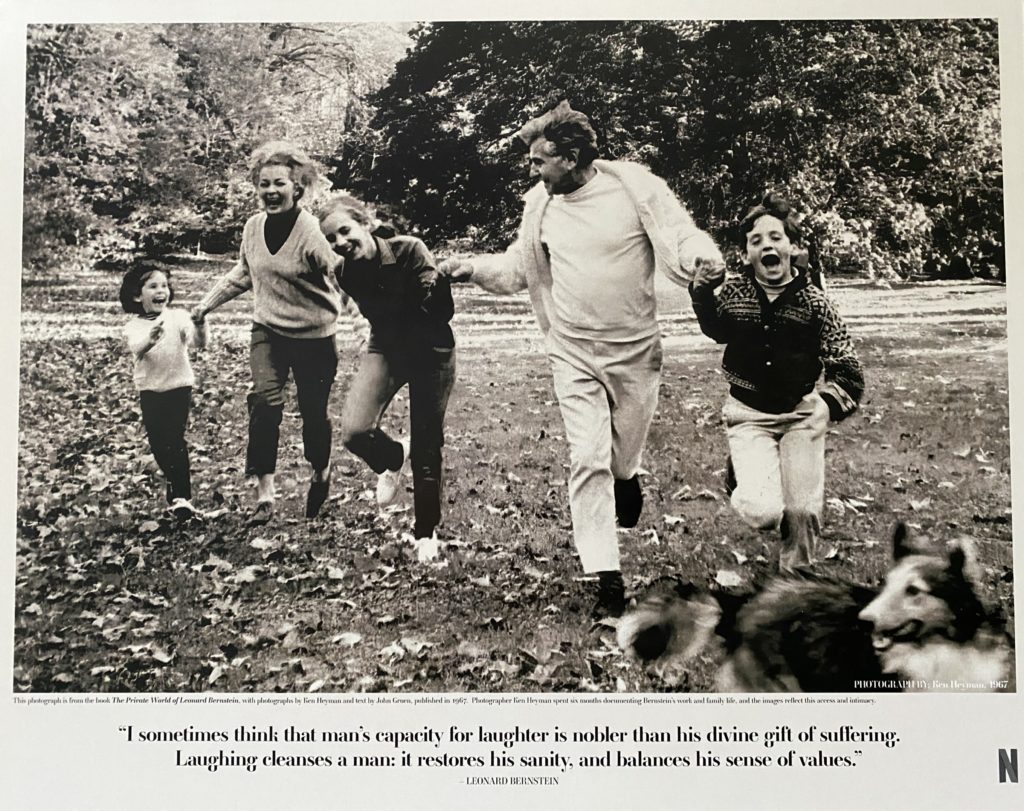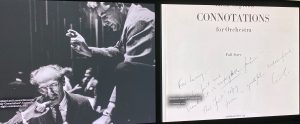
I don’t normally blog about something that is a current worldwide talking point. So where does one begin and what does one say, that hasn’t been said or written already about Bradley Cooper’s Maestro? The recently released biopic about the life of Leonard Bernstein and the relationship with his wife Felicia Montealegre has received plaudits from far and wide and is the hot tip to gain multiple Academy Award nominations and wins.
Prior to going to see the film at the Watershed this week I thought I would probably write about the movie from the Aaron Copland perspective. Unfortunately, that’s not really possible as Copland played by Brian Klugman features in just four scenes. Copland has just a few words to say and is there principally as a walk on part. There’s nothing to suggest the huge influence that these great stars of 20th century music had in each other’s careers. Copland is there to play a quick piano duet, make up the numbers at the dinner table (as Serge Koussevitzky lectures Bernstein on changing his name to Burns), a fellow slow dancer at a New York loft party and to get his arse slapped at Tanglewood. Brian Klugman looks like Copland and for the few words he says, sounds like Copland but I did feel a bit short changed. (You can hear just how good the accents are by listening to this clip – Copland says “all my fault” at 2:53).
OK, I do understand that this movie is not about Copland. But in some respects, in doesn’t feel like it is much about Bernstein either! I understand that this does seem an odd thing to say. However, the portrayal of Bernstein is largely one dimensional. The Netflix promo, (money no object) freebies that I picked up at the cinema, have images from Bernstein’s life on one side along with one of his quotes and on the other a still from the film showing stills of Cooper as Bernstein from the film. Virtually all the quotes are positive affirmations of life and the importance of music. Personally, I didn’t feel that this really was reflected at all in the picture.

Instead, it frequently accentuates his many negative character traits. From watching the film, I think most people would get a view that Bernstein was 80% narcissistic and 20% charismatic. For much of the movie you would probably be wondering how anyone could like Bernstein let alone love him. But of course, he was adored.
So, I suppose if I am to say something different about Maestro, it probably is as a dissenting voice.
Before I labour my points on what I was disappointed by, I think it only fair to reveal the aspects of Maestro that I liked. The acting is very good and there are some incredibly strong and touching scenes between the two leads. I agree with everyone that Carey Mulligan in particular is outstanding. I also think that Sarah Silverman and Maya Hawke lend excellent support. Hawke is particularly good as Bernstein’s vulnerable daughter Jamie. There are lots of visually impressive scenes, for instance the appearance of the enormous parade Snoopy out the window after the argument scene. The costumes, make up (including Cooper’s famous prosthetic nose) and cinematography are wonderful and almost certain to garner a room full of gongs come the awards season.
Much has been made of Cooper’s almost obsessive attention to detail. How he has taken six years to perfect Bernstein’s conducting style. Whether it’s his walk, or his smoking habit, Cooper has got the mannerisms down to a tee. He does a superb impersonation, but for me it is so over studied that it approaches the point of caricature.
Did Bernstein really smoke as much as he is portrayed in the film? When I watch it again on TV, I am going to work out how much of the film that he has a cigarette in his mouth or in his hand. He is portrayed as such a chain smoker that I must admit that I was surprised that in the scene when he was conducting Mahler’s Symphony No 2, that he didn’t have a smoke in his mouth or needed to nip off half way through and take a drag!
This is part of the problem. The cigarette acts as a great prop and Cooper uses it well. The way that his Bernstein touches thumb to finger as he smokes or holds the cigarette does look like it is period footage of Bernstein. However, does the use of a prop make for great acting? For instance, I can do a passable Groucho Marx impression with a pretend cigar. However, I doubt many people would know that I was doing a Groucho Marx impression if I didn’t have the cigar.
In hardly any of the photos I’ve seen, or YouTube clips I have watched is Bernstein smoking. The film would have been a much more well-rounded depiction of Bernstein had it included a scene featuring one of his Young Person’s Concerts. Instead, we get an afternoon open rehearsal for the public with Bernstein looking somewhat unkempt, bohemian with the obligatory cigarette in his mouth. It makes him look laissez faire when we all know that he was an absolute perfectionist.
Similarly, I felt that it was unfair to show him being gruff and impatient with the young conductor at Tanglewood towards the end of the film. This was showing the side of Bernstein that anyone who’s watched The Making of West Side Story would be familiar with (i.e. the way he lambasts Jose Carreras singing Maria). It would have been more balanced had they shown Bernstein being supportive in his mentoring role elsewhere in the film. Again, the portrayal makes you think that people would steer well clear of Bernstein rather than being drawn in by his enormous magnetism.
Bradley Cooper also sounds like Bernstein. But this is problematic too as he only has two versions of the voice – the young Bernstein and the old Bernstein. As a result, in scenes set in the early 1960s, the 40+ year old Bernstein sounds exactly like he does as an older man in the scenes set in the 1980s. If you watch a clip of a Young Person’s Concert, you’ll see that this was not the case.
I’m afraid to say that overall, the accent grated on me and that wasn’t the only thing!
In places the script is particularly bad. Right at the start of the movie one incidental character asks another “Is that the ballet he’s writing about three sailors in New York”. It comes across as forced, trying to provide ready answers rather than telling a story. Similarly, there are three times when the script could have been lifted straight out of the Wikipedia listing. There are two interview preambles (one as part of a TV programme and one involving a journalist) that seem to list Bernstein’s work and achievements. Similarly, the scene where Bernstein and Montealegre, as would be lovers discuss each other’s back story, is a vehicle designed to fill in the gaps. It just doesn’t come across as an authentic way that people talk to eachother.
A couple of other things didn’t work for me. After 15 minutes you’d be mistaken for thinking that the narrative of Maestro was going to play out in the style of La La Land. The first scene when Bernstein runs from his bed to Carnegie Hall and the later scene when Bernstein and Montealegre unnecessarily join in with the On The Town dance does not fit stylistically with the rest of the film. This is a flaw in Cooper’s direction and the biggest indication of this being a huge vanity project. It certainly proves that Cooper can do anything and everything and it’s done really well,but it just doesn’t fit. I think someone should have been bold enough to mention this.
Another thing that is almost laughable and again should have been kicked out as a bad idea was the use of REM’s It’s the end of the world as we know it when Bernstein drives into Tanglewood in his sports car. Wouldn’t it have been better to have had the song playing and stopping short of the line containing “Leo Nerd Bernstein”? That would have made it an in joke that everyone was in on. Instead, it’s just too obvious.
The film is quite Mahlerian in length. It’s a hard watch. A bit like Humphrey Burton’s Bernstein biography is often a hard read. It’s a shame as there is a lot to admire but it is excessive and doesn’t really hang that well together as a film?
Maybe that’s the point? The overall impression one gets from Maestro is that Bernstein, despite his enormous gifts felt that he wasted his talent. That despite doing so much, in so many areas that he could still have done more.
Some, no doubt will think I have been unfair in my critique. That the film is not meant to be about the music, Bernstein’s career and colleagues but more about his limitations as a husband and father and the complications brought by his sexual orientation. The sad thing is that apart from the Bernstein-Montealegre love affair there is virtually no space for any other meaningful relationships to develop. Bernstein never seeks counsel and only a couple of occasions does he have conversations with people other than his wife and daughter.
As a result, most people are there as bit part players – sumptuous and well attired but bit part players none the less.
It’s an impressive film but ultimately misses the mark. There are loads of things that could’ve been included but weren’t, that would have unveiled more layers of a very complex and brilliant individual. For instance, I would have loved there to have been more involvement for Copland and to show how totally opposite they were in virtually every way. One flamboyant and passionate and the other unshowy and modest and yet great friends and supporters of each other – the perfect yin and yang that could have provided Maestro with an interesting counterpoint to that of Bernstein’s relationship with Montealegre.





Blog Comments
withJ
31st December 2023 at 7:39 am
I am a fan of Copland as well. I was very disappointed at how small a part Copland plays. It was Bernstein’s performance of Appalachian Spring that my parents played on the record player when I was 4 that eventually inspired me to pursue a degree in Classical Music. And I too felt that the movie was too narrowly focused on making Bernstein a narcissist who didn’t seem to exist without a cigarette in his hand.
Jenn
23rd January 2024 at 3:37 pm
A dozen dissimilar but Grammy-worthy movies could be made about Bernstein. It would indeed be fascinating to see his relationship with Copland explored further.
About smoking: daughter Jamie says it was constant. See Youtube “Famous Father Girl: A Memoir of Growing Up Bernstein” at 3:45 https://youtu.be/xs4wCkVBXgE?feature=shared&t=225
Esther Smith
25th January 2024 at 5:28 am
Your blog has proven to be a valuable resource for practical insights. Every recommendation you share is truly remarkable. Much appreciation for sharing this insightful content.